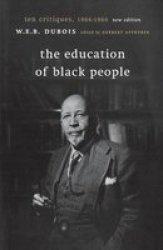Description
This essay is about the work of W.E.B. DuBois, who was an influential black intellectual in the 20th century. DuBois saw education as a process of teaching certain timeless values, such as moderation, an avoidance of luxury, a concern for courtesy, and a capacity to endure. He also saw education as fundamentally subversive, as it was a function of the well-established role of education-from Plato forward-as the realities of the social order under which he lived. DuBois insisted on great energy and initiative from African Americans, as well as continued experimentation and innovation in education. Though written nearly one-hundred years ago, The Education of Black People remains relevant and timeless.
Undoubtedly the most influential black intellectual of the twentieth century and one of America's finest historians, W.E.B. DuBois knew that the liberation of the African American people required liberal education and not vocational training. He saw education as a process of teaching certain timeless values: moderation, an avoidance of luxury, a concern for courtesy, a capacity to endure, a nurturing love for beauty. At the same time, DuBois saw education as fundamentally subversive. This was as much a function of the well-established role of education-from Plato forward-as the realities of the social order under which he lived. He insistently calls for great energy and initiative; for African Americans controlling their own lives and for continued experimentation and innovation, while keeping education's fundamentally radical nature in view. Though containing speeches written nearly one-hundred years ago, and on a subject that has seen more stormy debate and demagoguery than almost any other in recent history, The Education of Black People approaches education with a timelessness and timeliness, at once rooted in classical thought that reflects a remarkably fresh and contemporary relevance.
